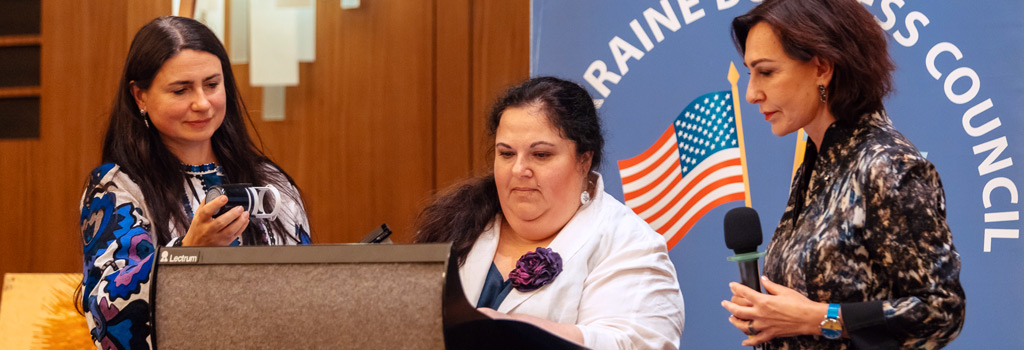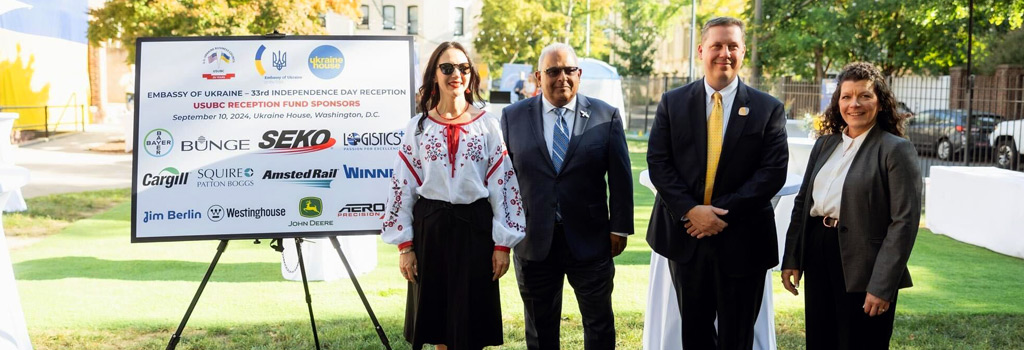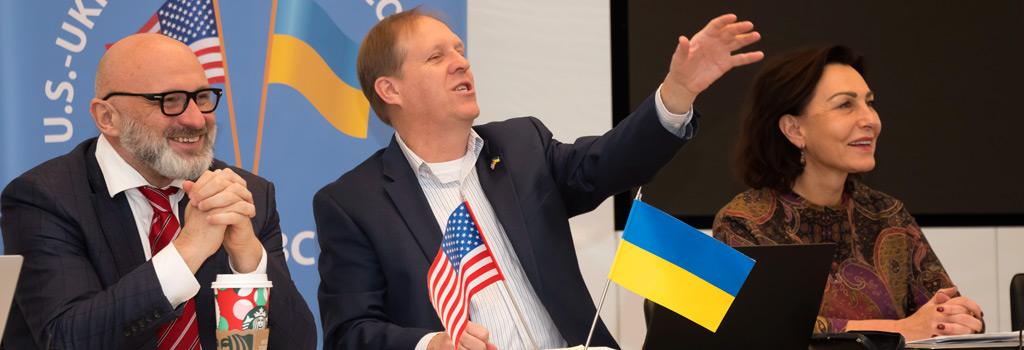Featured Galleries USUBC COLLECTION OF OVER 160 UKRAINE HISTORIC NEWS PHOTOGRAPHS 1918-1997
 Holodomor Posters
Holodomor Posters

UKRAINE - ELECTION OUTLOOK

Personal Analysis & Commentary by Tim Ash
[Timothy Ash is a London-based senior emerging markets sovereign strategist for Bluebay Asset Management Company.
He has been covering and writing about business, economics, government, politics, etc. in Ukraine for over 30 years.]
Bluebay Asset Manage, London, UK, January 21, 2019
LONDON - I have covered every presidential election in Ukraine in my 30 plus years covering the country, so here is my take on the forthcoming elections:
Q? What’s your outlook for elections?
Answer: Ukraine faces presidential elections at the end of March, and then parliamentary elections in October. Opinion polls suggest that the outcome of both is still too difficult to predict. That said, given past experience, the outcome of the presidential election will likely decisively impact on the outcome of the parliamentary poll.
In the presidential poll no one candidate is polling sufficiently well to give them, or us, any confidence as to the likely winner.
True, Yulia Tymoshenko, has a consistent lead, but even then she only seems to be polling in the mid teens. A welter of other candidates then poll in the mid to high single digits. It hence looks nigh on impossible for Tymoshenko, or any other candidate, to secure an outright victory in the first round poll (50% plus 1), so Ukraine seems all but certain to go to a run off vote in mid April.
Tymoshenko does though seem to be polling well enough, and the fact that with such a large field, the rest of the vote will be divided across so many candidates, suggests that Tymoshenko is almost certain to make it to the second round vote. The only question really is who will come second to Tymoshenko in the first round vote to run against her in the run off.
And on that note at this stage it’s really too early to tell.
Plenty of political pundits are banging the line that incumbency will benefit President Petro Poroshenko, but I have my doubts.
First, in the Ukrainian context I don’t believe much of what so called “pundits” write as Ukraine suffers from the post Soviet menace of political “technology” which means that many candidates employ teams of “pundits” and/or journalists to support their cause, and to talk down that of their their opponents. I sense Poroshenko is no different. And there is a weight of twitter trollers who are banging the pro-incumbent line that Poroshenko is the only candidate to be trusted, that he is the candidate of continuity who can defend reform progress to date, and defend the country from the threat from Russia in the East - and the country and the West should get behind him.
His supporters argue that his campaign messages of church (securing autocephalous status for the Ukrainian Orthodox Church), a strong army, and economic stability will eventually play well with the electorate. Their logic is that when push comes to shove the Ukrainian electorate will eventually opt for what they know best and will not take any risks.
But again to reiterate that there seems to be few really independent commentators in the Ukrainian context - be careful what/who you read!
I am not sure the population really buy this line that Poroshenko is the sole candidate who can uphold Ukrainian sovereignty and provide for improving living standards.
Second, and indeed his opinion poll ratings tell a different story, he really seems to be struggling to get ahead of the peloton of riders chasing Tymoshenko. Despite all the recent wins - including autocephalous status - he is struggling to gather any momentum.
Third, I think we just have to accept that with the rise of populism and nationalism globally, we are no longer in the age of incumbency. Populations want something different, and that could be populism. As a result Poroshenko might simply be offering the wrong brand. He is offering economic prudence, stability and the status quo. But populations, in Ukraine or elsewhere, at present seem to want change, or they want to think they are going to get change - from Brexit to Trump and on to Bolsonaro. And the problem for Poroshenko is that he is the archetypal Ukrainian politician and representative of the status quo - an oligarch, who has been in/close to government for the best part of two decades now. It seems that Porosohenko is really struggling to break out of this strait jacket view of himself.
Whichever way he tries to shake it, Poroshenko has had the chance to bring change, but has failed to deliver enough meaningful change to ordinary Ukrainians lives, or that seems to be the message coming from polling data. And it looks like he will struggle to rebrand himself - indeed, he is marketing himself as the candidate of least change which could prove to be a strategic mistake in this election.
I guess also Poroshenko and his team think that macro stability, and the delivery of 3% or so growth now is a real achievement. But in reality, under his watch, the bulk of the populations living standards are not much higher now than when he took office. Or at least that is what they are likely to think. And when it comes to what seems to be important for the population, from various opinion polls conducted - fighting corruption and ending the war in the East - Poroshenko has not really delivered. To be fair to Poroshenko, the continuation of the war in the East, is not really his fault, but that of Russia, and the West’s failure to adequently bring Russia to account. But Poroshenko as the incumbent president probably wins few accolades for the fact the war is still continuing. It may also be the case that the population think that some new approach - or new leader - is needed to try and break the impasse in the East. Just something different is needed.
So my take is that Poroshenko faces a really uphill struggle at this stage to get into any second round vote.
It’s also been interesting, that as Poroshenko has languished in the polls, his last gasp efforts to create some momentum in the polls, for example his response to the Kerch strait incident and the clumsy imposition of martial law, just appeared to backfire. Many people saw in the attempt to impose martial law as an attempt to delay the elections, to extend his stay in office and perhaps to give his poll ratings time to recover. This appeared decidedly undemocratic. He denied this and, to give him credit, did eventually limit the imposition of martial law both in time and space
Q? But surely the same criticisms could be levelled at Tymoshenko
Answer: Absolutely. She has the same old oligarch style CV and like Poroshenko has been in and around Ukrainian politics for the past two decades or more. But unlike Poroshenko who spent most of his time in politics in office - under President Yushchenko, and even Yanukovych, Tymoshenko really only had two relatively brief stints in office as prime minister (2005-06, and then 2008-10) and even then was seen as something of an outsider - she seemed to be at war with most of the Ukrainian political establishment, including Poroshenko, during these stints. And she continues to actively promote herself as a disrupter, and agent of change - many political peers would certainly vouch that she was a disruptor in her two prior stints as prime minister - but they would contend that she delivered little in terms of policy. But I would say her mantle as a disruptor suggests that if Poroshenko manages to get into a second round run off with Tymoshenko, I think she will win. I think the population think that Poroshenko has had his chance, and it’s time for someone else to have a go, even chancing that on Tymoshenko. There is also a good argument I have heard that suggests voting against a second term for Poroshenko will safeguard against Poroshenko and his supporters securing too much power/capture of the state which a second term might risk, and a victory by an opponent such as Tymoshenko will at least provide a degree of balance between oligarchs, even though there might be little real difference between Poroshenko and Tymoshenko in terms of their fundamental drivers.
Q? So could there a surprise winner/candidate?
Answer: It is possible. Tymoshenko can be beaten, as she still has high disapproval ratings. And I think we saw from the 2010 (Tyhipko) and also 1995 (Kuchma) elections that surprise (if in both these case not really change) candidates can do well. It’s possible to imagine one of the candidates from the pack getting into the second round and then giving Tymoshenko a real run for her (or someone else’s) money.
But who?
Well the early money was on the pop star, Svyatoslav Vakarchuk, but he seems to have talked himself out of running in this presidential contest - he could still declare but time is running out, and in any event I think he has lost too much momentum now to win.
The new rising name is the comedian, Vladimir Zelenskiy. He is getting a lot of air time, and has high name recognition due to his showbiz personality. But his vulnerability and weakness lies around questions over who are his ultimate business and political backers - Kolomoisky? And more recently there have been questions over his business interests in Russia. He might be funny, but I think serious questions are being asked as to whether he is his own man, or just a political project for yet another oligarch. And I am not sure when pitted against a wily political operator such as Tymoshenko, that the electorate will just opt for a person they know is their own man, or woman in the case of Tymoshenko. Whatever her faults, and there are no doubt many, no one can accuse Tymoshenko, of being the puppet of anyone - albeit the Poroshenko camp seem to be suggesting she is the puppet of Moscow as one of their lines of attack.
The former defence minister, Anatoliy Hrytsenko, also has a decent chance of getting into the second round ahead of Poroshenko. But he seems to have soured his cause by some strange appointments into his campaign, and is also now not really seen as a candidate of change or of real dynamism - he has also been around Ukrainian politics for many years.
Q? What are the chances of a pro-Russian candidate?
Answer - close to zero.
I don’t even think a candidate such as Opposition Block leader, Yuri Boiko, could get into any second round vote. You have to remember here that despite all the problems and challenges facing Ukraine over the past 4 years or so since Euromaydan, that opinion polls have not really changed in terms of showing close to two thirds support for Ukraine’s Western orientation. Back pre the Russian annexation of Crimea, a solid third of the electorate, predominately in Eastern Ukraine, did back closer ties to Russia, and this constituency was the mainstay of the former Regions Party of former President Yanukovych - of which Boiko was a member, and as earlier was also President Poroshenko as a founding father of the party. But since the annexation of Crimea, and the Russian intervention in Donbas, support for closer ties to Russia has dropped into single digits. This reflects the loss of voters in Crimea and DPR and LPR, but also general disillusionment with Russian policy towards Ukraine - which has seen the loss of over 10,000 lives, many more injured and millions internally displaced. The core vote for candidates such as Boiko has hence collapsed, and added problems have been splits in the Opposition Block with now rival candidates emerging in the presidential election.
Simply put, a candidate with a pro-Russian outlook is now unelectable in Ukraine. And even in the unlikely event that someone like Boiko secured a second round spot, he would almost certainly be heavily beaten by any pro-Western candidate, whether that is Tymoshenko, Poroshenko, et al.
Q? So who is going to win?
Answer: I don’t know, but Tymoshenko is the person to beat still in my mind. I cannot see Poroshenko getting a second term, so it would need some other candidate, from the pro-Western crew to emerge to challenge her. But so far no one, aside from Zelenskiy, seems to be showing their spurs.
My gut tells me the run off is likely to be Tymoshenko against Zelenskiy and I think Tymoshenko likely wins that contest.
Q? What would be Moscow’s favoured outturn?
Answer: Well any outcome that undermines Ukrainian sovereignty is the simple answer.
I am sure that Moscow’s favoured candidate would be someone like Boiko. But surely Moscow must now understand the near impossibility of such an outcome. Or maybe not. Indeed, I am always amazed by how badly Russia reads Ukrainian politics - perhaps because they cannot really be borthered to understand it as fundamentally they do not take Ukrainian sovereignty seriously.
Zelenskiy might be a good outcome for Moscow, allowing them to delight in the comedy of a comedian assuming the reins of Ukrainian power, and assuming that such an inexperienced leader would inevitably screw up, and to their advantage. But I am not sure that Moscow would be that assured by the likely oligarchic backers of Zelenskiy.
Tymoshenko’s political opponents continuously bang the line that Putin would love to see the former prime minister finally assume the presidency, harking back to the deals cut between Tymoshenko and Putin when she was last in office, including the much criticised 2009 gas supply deal. But no Ukrainian politician could bow down to Moscow at this stage, as the Ukrainian body politic has just moved so far West. Such an outcome would inevitably see mass street demonstrations which second time around, and given the Russian context, could prove more violent. And I am not even sure that the 2009 gas price deal was that favourable to Moscow anyway - the recent Stockholm ruling was in Ukraine’s favour after all.
Moscow might not be enarmoured towards President Poroshenko, viewing him as having not delivered on commitments under the Minsk II Agreement - albeit the Ukrainian and Russian perceptions of this deal were always far apart. But I do not think that Moscow would view Tymoshenko as an easier counterpart - indeed, she has ardent and trusted Europhiles in her team, including Gregoriy Nemiyra, and has also been close to Borys Tarasiuk. Is anyone really seriously questioning Nemiyra’s orientation? I don’t think so. And I think we also need to remember that Tymoshenko was imprisoned by the former pro-Russian President, Viktor Yanukovych. So she has her own battle scars from fighting the pro-Western cause, including during the Orange Revolution.
Q? What about economic policy and the state of the economy
Well Tymoshenko’s critics would argue that she will run a populist agenda, which will endanger macroeconomic stability and the future of the recently revamped IMF programme.
And therein it is true that she is talking the populist talk - against the IMF programme, against gas price hikes, against the privatisation of land, and also threatening to remove from office the highly respected (by the market) incumbent governor of the NBU (Yakiv Smoliy), and much more including some suggestions of restructuring the country’s debt (buy back of warrants presumably).
But I would caution against this black versus white view of the relative economic merits between a Tymosehnko and a Poroshenko presidency - as indeed several reform members of the current Ukrainian government assured me during a recent trip to Kyiv, they do not see that much actual difference between a future Tymoshenko presidency and a second term for Poroshenko in terms of economic policy at least.
I say this for a number of reasons.
First, even a cursory read of the IMF staff report published in late December and detailing the request (accepted) for Ukraine to move from an EFF to a regular Stand-by arangement can see the clear frustrations from the IMF over programme compliance from the Groysman administration. I think it is testimony herein that no IMF funds were disbursed between April 2017 and December 2018. Indeed, the IMF staff report makes clear the stalling in the pace of key structural reforms under Groysman, albeit still highlighting success in macro stabilisation and while perhaps much of the work therein was some under the previous Yatseniuk administration and was due to the continuing endeavours of the team at the NBU and MOF.
Reading from the Staff report (https://www.imf.org/en/Publications/CR/Issues/2019/01/08/Ukraine-Request-for-Stand-By-Arrangement-and-Cancellation-of-Arrangement-Under-the-Extended-46499) it’s clear that the SBA is a bridging loan to get Ukraine through elections, but whoever wins there will be the need for a thorough rethink in terms of the shape/course of relations with the IMF with the need for a major revamp around conditionality attached in terms of structural reform.
Second, and because of the above promises made by Tymoshenko and other populist politicians (and remember therein that the incumbent administration also took the populist course by delaying gas price hikes for 18 months under the EFF), I think the initial market reaction to a populist win will likely be negative. The new (or old) rulers to emerge after the presidential vote likely will be faced with a depreciating UAH, rising debt service costs and pressure on already scarce FX reserves. They will be forced to go back to the IMF soon after winning and recommit to a more rigorous programme than is set out in the SBA, which is really just a stop gap. And, in Tymoshenko’s case, we have been there before - in 2008, as the global financial crisis hit, Tymoshenko initially resisted calls to go on an IMF programme. But in that case and to quote Star Wars: “resistance is futile” and Tymoshenko quickly agreed an IMF programme late in 2008. Now the success of that programme was decidedly mixed, but this time around the lessons of the past and the needs of Ukraine suggests that the IMF will be far more savvy in how it plays the new Ukrainian administration - likely being less willing to rush into any deal, but more eager to get strong conditionality attached, including I think real commitments around central bank independence, plans for privatisation, banking sector reform, land reform, reform of the state fiscal service, et al.
And while we are on the issue of privatisation, remember that Tymoshenko still delivered the biggest and most successful privatisation in Ukraine’s history with the re-privatisation of the Kryvorizhstal steel plant back in 2005, where she secured an additional USD4bn for the state from the somewhat dubious first effort to sell the plant to Ukraine’s biggest oligarch, Rinat Akhmetov. So the experience herein is that Tymoshenko is not necessary anti market.
Q? And what about macro stability, how assured is it?
Answer: Somewhat, but not for long given the risks that a populist presidency would suggest. The latest IMF, EU and World Bank disbursements have pushed reserves up over USD20bn, over 3 months of import cover. That’s probably enough to get through elections, but only just. And previous bouts of economic populism, under Yanukovych, Tymoshenko, et al, have shown that pressure on the UAH can quickly build and reserves easily get frittered away. The twin deficits have been reined in, but also these improvements could easily reverse with unorthodox policies on energy pricing, and if, for example, Tymoshenko holds by her threat to remove the incumbent governor of the NBU which would inevitably challenge its hard won independence. Ukraine also faces a heavy weight of debt service both this year and next, and I don’t think foreign creditors would be impressed with some of the populist economic mantras beings touted pre election. They would almost inevitably vote with their feet which would risks a debt crisis could come over Ukraine quite quickly if the wrong economic course is chosen. So again this suggests that any future president’s options will be limited. They will need to recommit quickly to a new IMF programme - they simply lack alternative options/financing sources.
Q? What about parliamentary elections?
Well given Ukraine’s “rotten borough” electoral system with a mixed PR/constituency system, power tends to go to the winner in the presidential elections. I mean here that whoever wins the presidential poll will likely do well in the parliamentary election as MPs rally around the “party of power”. The constituency system also sees a disproportionate represention of oligarchs and business and they will be quick to cut deals with the winners in the presidential system to ensure their support in Parliament. But we still have to get to the presidential poll, and the six month gap between the two leaves the country vulnerable to pork barrelling from whoever emerges victor in the presidential polls. During this time the country could drift economically, and therein the integrity of the NBU and the IMF backstop could be critical. Note here that Tymoshenko has promised to change the constitution to give powers back to parliament, and also to potentially change electoral laws, but let’s see if she delivers if she ends up winning the presidency. She would indeed prove her democratic credentials if having won the presidency she then surrenders these newly won powers to parliament. Let’s see.
And let’s seems to be the right by-line for these elections. All is to be decided and up for grabs. The elections are still wide open.
NOTE: -Please note that any views expressed herein are those of the author as of the date of publication and are subject to change at any time due to market or economic conditions. The views expressed do not reflect the opinions of all portfolio managers at BlueBay, or the views of the firm as a whole. In addition, these conclusions are speculative in nature, may not come to pass and are not intended to predict the future of any specific investment. No representation or warranty can be given with respect to the accuracy or completeness of the information. Charts and graphs provided herein are for illustrative purposes only.”
-----------------------------------------------------------------------------------------------------------------
NOTE: DISTRIBUTED FOR INFORMATION PURPOSES ONLY
The views expressed in the article are totally the personal views of the author Tim Ash.
Timothy Ash is a London-based senior emerging markets sovereign strategist for Bluebay Asset Management Company.
He has been covering and writing about business, economics, government, politics, etc. in Ukraine for over 30 years.

















